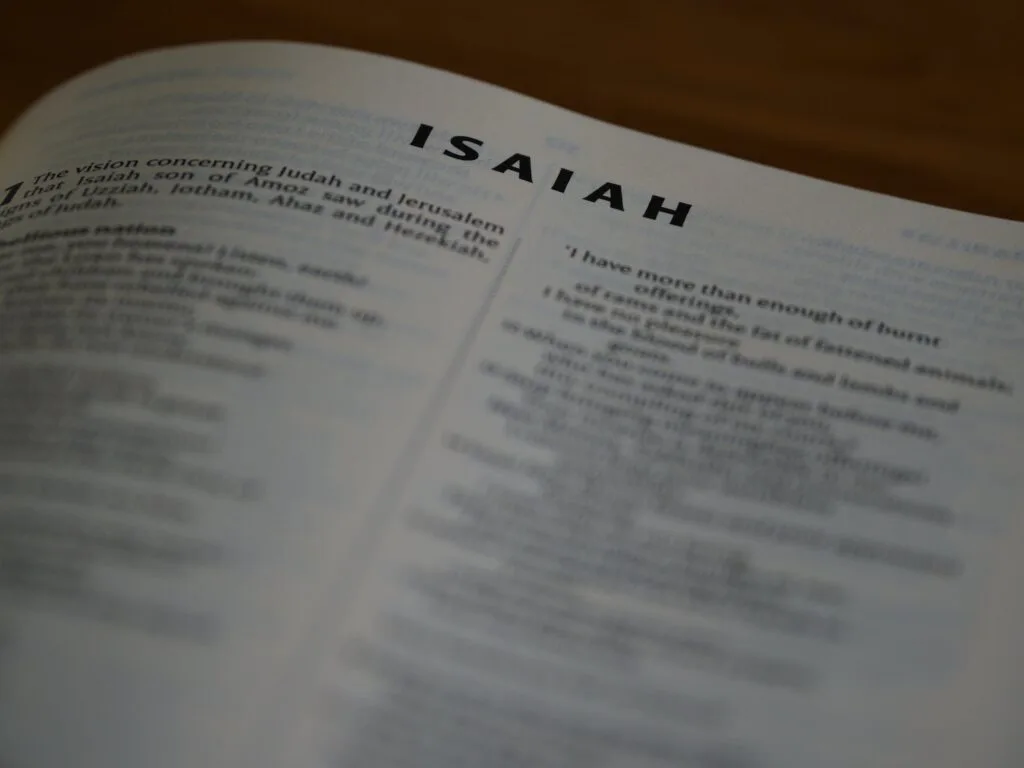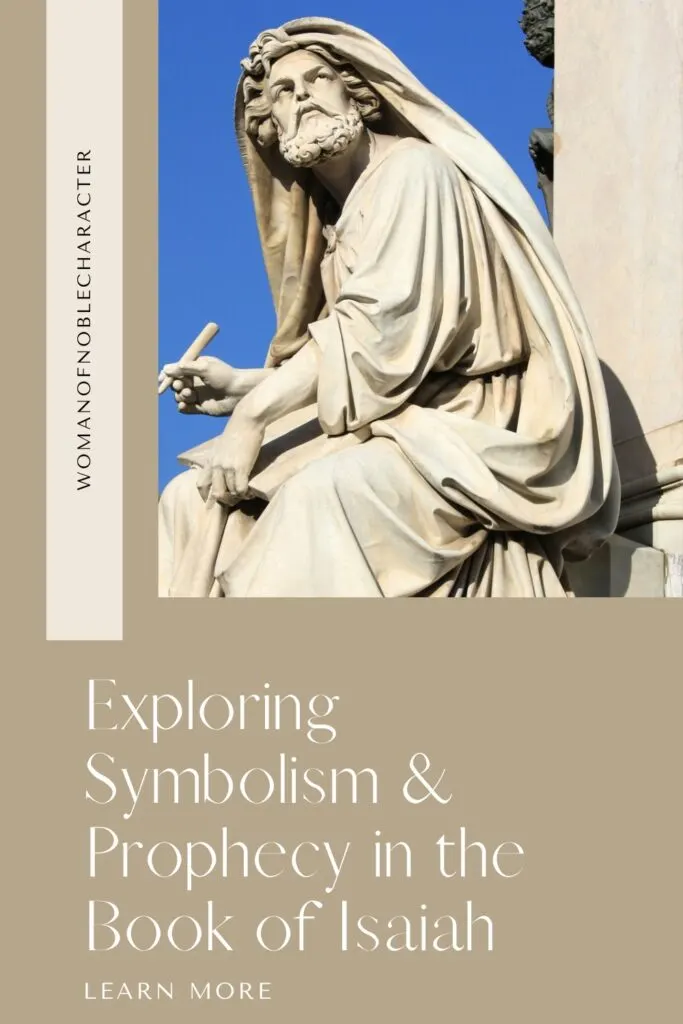This page/post may contain affiliate links. As an Amazon Associate, as well as an affiliate of other programs, this means if you purchase something using these links, I will receive a commission on qualifying purchases at no cost to you! For more detailed information, please visit our Affiliate Disclaimer page
The most comprehensive prophetic picture of Jesus can be found in the book of Isaiah. In addition to including the full scope of His life (from the announcement of His coming in Isaiah 40:3-5 to His return to claim His own in 60:2-3), Insight points out that the book itself serves as a testament of hope in the Lord. Along with warnings of the coming judgment–of which the hum is especially felt these days–the book of Isaiah conveys messages of hope. By understanding the various examples of symbolism that can be found within scripture, women (as well as men) can seek comfort in Isaiah as well as strength through the ups and downs of life.

Interpreting the many symbols in the Book of Isaiah
Isaiah’s name translates to “Jehovah saves” or “the Lord is salvation.” Known for being among the greatest of the prophets, Isaiah’s writings hold great significance — in fact, the Lord Himself said: “Great are the words of Isaiah. For surely he spake as touching all things concerning my people which are of the house of Israel” (3 Nephi 23:1-2).
With Isaiah being quoted in other scriptures more than any other prophet, the value of his words is immense as the use of symbolism peppered throughout. Symbols such as grass, The Vineyard, and even wild animals are common throughout the book. For example, while The Vineyard references many churches and Christian fellowships, it’s explained that wild animals and demons are symbols referred to when cities are destroyed — a symbol of a city that has displeased God, which results in it being ‘reduced to a state of nature.’
Shmoop.com points out that Isaiah constantly compares humans to vegetation (grass) in aspects such as dying, growing, and flourishing. Isaiah 40:6-7, for example, states, “All flesh is grass, and all the goodliness thereof is as the flower of the field: The grass withereth, the flower fadeth: because the spirit of the Lord bloweth upon it: surely the people is grass.” The message serves as one of comfort, conveying God’s grace to His people. In times of difficulty, women can take comfort in the fact that everything is temporary — from challenges surrounding parenthood and relationships or even when working through a bad day.
Unraveling the meaning — finding inspiration through scripture.
The Isaiah 64:8 verse contains a symbolic reference to the potter and clay image, typically bringing it up when God is stressing a point about disobedience. “But now, O Lord, thou art our father; we are the clay, and thou potter; and we all are the work of thy hand.” This verse can be particularly inspirational for any women who seek strength through their relationship with God — ‘we are the clay’ and God, the ‘potter,’ shaping us into the Christians we are meant to be. This provides comfort in knowing that we are God’s creation and underlines how we can be modeled into a new vessel — much like clay.
The analogy and nature of clay, from the shaping (and even cracking or breaking) of the natural material, can easily be applied to life, with shaping representing growth and cracking or breaking representing the difficulties of life.
There is more to unravel through Isaiah 64:8. A Lightsource post by Bible Pathways points out that in addition to the general understanding of the message that conveys growth by the Potter remolding the clay into something new, the scripture also highlights the part of the verse that states “thou art our Father.”
This part of the verse showcases our relationship with God, with Lightsource explaining that nobody knows our fundamental human needs for hope, love, and peace as He does. “God chose Fatherhood from all possible human relationships. There was something significant that God wanted to communicate by His choice of this title.” In acknowledging the fact that God is our heavenly Father, we can better understand our spiritual relationship while unraveling the deeper meaning of His teachings.
Isaiah 64:8 is far from the book’s only inspirational verse that uses symbolism. Isaiah 40:31 is a great example of finding strength through scripture, as the verse reads: “But those who hope in the Lord will renew their strength; they will fly up on wings like eagles; they will run and not be tired; they will walk and not be weary.” This verse reminds us that even in times of difficulty and weariness, we should be looking to the Lord for strength. Whether you’re facing the challenges of becoming a new mother or navigating health matters, finding strength can be achieved by maintaining hope in the Lord.

Discovering our purpose
For many Christian women, understanding the Bible is the start of discovering a God-given purpose. Psalm 119:105 is just one example of this, as it says, “Your word is a lamp to my feet and a light to my path.” According to Cornerstone University, this verse highlights the importance of God’s word, as it works to lighten paths that may otherwise appear dark. By better understanding God’s word, one can learn how to live by the Bible, thus getting one step closer to finding purpose.
“Also I heard the voice of the Lord, saying: “Whom shall I send, and who will go for us?” Then I said, “Here am I! Send me.”” The Isaiah 6:8 verse sends a powerful message, though it can be difficult to understand without the knowledge of the precursory verses, context, and symbolism within the book of Isaiah. In a nutshell, the sixth chapter of the Book of Isaiah is about his calling to be the messenger of God to the people of Israel.
It largely revolves around Isaiah’s “conviction, cleansing, and call to God,” while the overall message of the verse Isaiah 6:8 translates to knowing our purpose in life and our response to it. “We are called to serve others in love, and our response to God’s purpose is to express our faith through our daily lives either in our workplace or community,” explains Trinity Funmi Akinwale. When seeking to apply the biblical verse to one’s life, Funmi Akinwale notes that doing so involves knowing your purpose and calling in life. Focus and discipline are noted to be essential in doing so “so as not to digress.”
The form you have selected does not exist.
Understanding the Bible can be a challenge due to the wording and immense amount of symbolism present. By better understanding the prophetic symbolism within the book of Isaiah, one can effectively apply the messages to life.
You may also enjoy this video by Our Daily Bread on the Prophecies in the Book of Isaiah.
Or one of these recommended resources:
Isaiah, the Gospel Prophet by M. L. Andreasen
A Prophet Called Isaiah by Kenneth Winter

Lottie is a freelance writer and a mother of two daughters. She is a regular reader in her local church and assists at Sunday School. Lottie enjoys contributing to a range of publications, both written and online, about faith-related topics.

